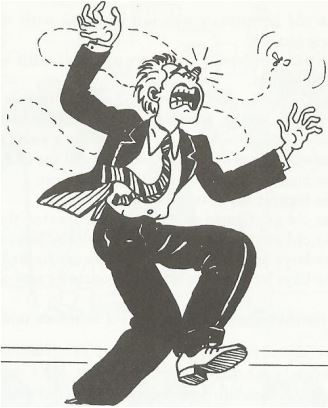
It was a bee
 المؤلف:
L.A Hill
المؤلف:
L.A Hill
 المصدر:
Advanced-Anecdotes in American English
المصدر:
Advanced-Anecdotes in American English
 الجزء والصفحة:
46-1
الجزء والصفحة:
46-1
 20/10/2022
20/10/2022
 1719
1719

One day, when Mr. Smith came home from work, he found his wife very annoyed about something. Mr. Smith always thought that he was more sensible than his wife, so he started to give her a lecture on the importance of always remaining calm.
Finally he said, "It's a waste of your strength to get excited about small things. Train yourself to be patient, like me. Now, look at the fly that has just landed on my nose. Am I getting excited or annoyed? Am I swearing or waving my arms around? No, I'm not. I'm perfectly calm."
Just as he had said this, Mr. Smith started shouting. He jumped up and began to wave his arms around wildly and swear terribly. He couldn't speak for some time, but at last he was able to tell his wife: the thing on his nose hadn't been a fly, it had been a bee.
A Answer these questions:
- What did Mr. Smith find when he came back from work one day?
- What did he think about himself?
- What did he do as a result?
- What did he say to his wife?
- What did Mr. Smith do then?
- Why did he do this?
B Which of these answers are correct? Write down the questions and the correct answers.
1. How was Mrs. Smith feeling when her husband came home?
- She was very happy.
- She was very mad.
2. Why did Mr. Smith think that he could help her?
- Because he thought she was usually calmer than he was.
- Because he thought he was usually calmer than she was.
3. What did he claim to be his way of dealing with the insect on his nose?
- He claimed to be excited and angry about it.
- He claimed to be calm and patient about it.
4. What was the insect?
- A bee.
- A mosquito
5. What happened when he discovered what it was?
- He remained perfectly calm.
- He got excited and angry.
C Write this story, putting one word in each blank space. You will find all the correct words in the story.
Mr. Williams was famous for his bad temper. When something ________ him, which happened quite often, he used to __________ his arms around in the air and begin to __________ , using the rudest words he knew, which was _________ bad for his children, because they learned to do the same thing
His wife was very different: she was a quiet, _________ woman who knew the _______ of _______ calm under all circumstances, to avoid wasting one's __________ uselessly. She tried to ________ her children to do this too, and sometimes made them sit down and listen to a ________ about the need for patience.
 الاكثر قراءة في Advanced
الاكثر قراءة في Advanced
 اخر الاخبار
اخر الاخبار
اخبار العتبة العباسية المقدسة


